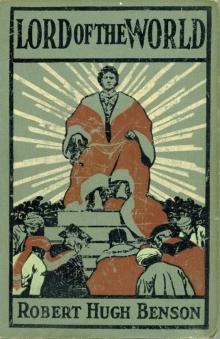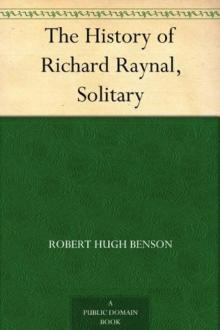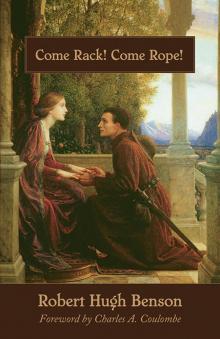- Home
- Robert Hugh Benson
Come Rack, Come Rope Page 17
Come Rack, Come Rope Read online
Page 17
Mr. Thomas and his wife were actually on their way from Norbury when the arrest had been made. Mr. Thomas had intended to pass a couple of nights in Derby on various matters of the estates; and although, his wife said, he had been somewhat silent and quiet since the warning had come to him from Mr. Audrey, even he had thought it no danger to ride through Derby on his way to Padley. He had sent a servant ahead to order rooms at the inn for those two nights, and it was through that, it appeared, that the news of his coming had reached the ears of the authorities. However that was, and whether the stroke had been actually determined upon long before, or had been suddenly decided upon at the news of his coming, it fell out that, as the husband and wife were actually within sight of Derby, on turning a corner they had found themselves surrounded by men on horses, plainly gathered there for the purpose, with a magistrate in the midst. Their names had been demanded, and, upon Mr. Thomas’ hesitation, they had been told that their names were well known, and a warrant was produced, on a charge of recusancy and of aiding her Grace’s enemies, drawn out against Thomas FitzHerbert, and he had been placed under arrest. Further, Mrs. FitzHerbert had been told she must not enter the town with the party, but must go either before them or after them, which she pleased. She had chosen to go first, and had been at the windows of the inn in time to see her husband go by. There had been no confusion, she said; the townsfolk appeared to know nothing of what was happening until Mr. Thomas was safely lodged in the ward.
Then she burst out crying again, lamenting the horrible state of the prison, as it had been described to her, and demanding to know where God’s justice was in allowing His faithful servants to be so tormented and harried.…
Marjorie watched her closely. She had met her once at Babington House, when she was still Elizabeth Westley, but had thought little or nothing of her since. She was a pale little creature, fair-haired and timorous, and had now a hunted look of misery in her eyes that was very piteous to see. It was plain they had done right in coming: this woman would be of little service to her husband.
Then when Alice had said a word or two, Marjorie began her questions.
“Tell me,” she said gently, “had you no warning of this?”
The girl shook her head.
“Not beyond that which came from yourself,” she said; “and we never thought——”
“Hath Mr. Thomas had any priests with him lately?”
“We have not had one at Norbury for the last six months, whilst we were there, at least. My husband said it was better not, and that there was a plenty of places for them to go to.”
“And you have not heard Mass during that time?”
The girl looked at her with tear-stained eyes.
“No,” she said. “But why do you ask that? My husband says——”
“And when was the first you heard of Topcliffe? And what have you heard of him?”
The other’s face fell into lines of misery.
“I have heard he is the greatest devil her Grace uses. He hath authority to question priests and others in his own house. He hath a rack there that he boasts makes all others as Christmas toys. My husband——”
Marjorie patted her arm gently.
“There! there!” she said kindly. “Your husband is not in Topcliffe’s house. There will be no question of that. He is here in his own county, and——”
“But that will not save him!” cried the girl. “Why——”
“Tell me,” interrupted Marjorie, “was Topcliffe with the men that took Mr. Thomas?”
The other shook her head.
“No; I heard he was not. He was come from London yesterday morning. That was the first I heard of him.”
Then Alice began again to soothe her gently, to tell her that her husband was in no great danger as yet, that he was well known for his loyalty, and to do her best to answer the girl’s pitiful questions.
She stood up presently, grave with her thoughts. Mistress Alice glanced up.
“I am going out for a little,” said Marjorie.
“But——”
“May two of your men follow me at a little distance? But I shall be safe enough. I am going to a friend’s house.”
Marjorie knew Derby well enough from the old days when she rode in sometimes with her father and slept at Mr. Biddell’s; and, above all, she knew all that Derby had once been. In one place, outside the town, was St. Mary-in-Pratis, where the Benedictine nuns had lived; St. Leonard’s had had a hospital for lepers; St. Helen’s had had the Augustinian hospital for poor brothers and sisters; all this she knew by heart; and it was bitter now to be here on such business. But she went briskly out from the hall, and ten minutes later she was knocking at the door of a little attorney, the old partner of her father whose house faced the Guildhall across the little market-square. It was opened by an old woman who smiled at the sight of her.
“Eh! come in, mistress. The master saw you ride into town. He is in the upstairs parlour, with Mr. Bassett.”
The girl nodded to her bodyguard, and followed the old woman in. She bowed as she passed the lawyer’s confidential clerk and servant, Mr. George Beaton, in the passage—a big man, with whom she had had communications more than once on Popish affairs.
Mr. John Biddell, like Marjorie’s own father and his partner, was one of those quiet folks who live through storms without attracting attention from the elements, yet without the sacrifice of principle. He was a Catholic, and never pretended to be anything else; but he was so little and so harmless that no man ever troubled him. He pleaded before the magistrates unobtrusively and deftly; and would have appeared before her Grace herself or the Lord of Hell with the same timid and respectful air, in his iron-rimmed spectacles, his speckless dark suit, and his little black cap drawn down to his ears. He had communicated with Marjorie again and again in the last two or three years on the subject of wandering priests, calling them “gentlemen,” with the greatest care, and allowing no indiscreet word ever to appear in his letters. He remembered King Harry, whom he had seen once in a visit of his to London; he had assisted the legal authorities considerably in the restoration under Queen Mary; and he had soundlessly acquiesced in the changes again under Elizabeth—so far, at least, as mere law was concerned.
Mr. William Bassett was a very different man. First he was the brother-in-law of Sir Thomas FitzHerbert himself; and was entirely of the proper spirit to mate with that fearless family. He had considerable estates, both at Langley and Blore, in both of which places he cheerfully evaded the new laws, maintaining and helping priests in all directions; a man, in fact, of an ardent and boisterous faith which he extended (so the report ran) even to magic and astrology; a man of means, too, in spite of his frequent fines for recusancy, and aged about fifty years old at this time, with a high colour in his face and bright, merry eyes. Marjorie had spoken with him once or twice only.
These two men, then, first turned round in their chairs, and then stood up to salute Marjorie, as she came into the upstairs parlour. It was a somewhat dark room, panelled where there was space for it between the books, and with two windows looking out on to the square.
“I thought we should see you soon,” said the attorney. “We saw you come, mistress; and the fellows that cried out on you.”
“They had their deserts,” said Marjorie, smiling.
Mr. Bassett laughed aloud.
“Indeed they did,” he said in his deep, pleasant voice. “There were two of them with bloody noses before all was done.… You have come for the news, I suppose, mistress?”
He eyed her genially and approvingly. He had heard a great deal of this young lady in the last three or four years; and wished there were more of her kind.
“That is what I have come for,” said Marjorie. “We have Mrs. Thomas over at Babington House.”
“She’ll be of no great service to her husband,” said the other. “She cries and laments too much. Now——”
He stopped himself from paying his compliments. It seemed to him th
at this woman, with her fearless, resolute face, would do very well without them.
Then he set himself to relate the tale.
It seemed that little Mrs. Thomas had given a true enough report. It was true that Topcliffe had arrived from London on the morning of the arrest; and Mistress Manners was perfectly right in her opinion that this signified a good deal. But, it seemed to Mr. Bassett, the Council had made a great mistake in striking at the FitzHerberts. The quarry was too strong, he said, for such birds as the Government used—too strong and too many. For, first, no FitzHerbert had ever yet yielded in his allegiance either to the Church or to the Queen’s Grace; and it was not likely that Mr. Thomas would begin: and, next, if one yielded (suadente diabolo, and Deus avertat!) a dozen more would spring up. But the position was serious for all that, said Mr. Bassett (and Mr. Biddell nodded assent), for who would deal with the estates and make suitable arrangements if the heir, who already largely controlled them, were laid by the heels? But that the largeness of the undertaking was recognised by the Council was plain enough, in that no less a man than Topcliffe (Mr. Bassett spat on the floor as he named him), Topcliffe, “the devil possessed by worse devils,” was sent down to take charge of the matter.
Marjorie listened carefully.
“You have no fear for yourself, sir?” she asked presently, as the man sat back in his chair.
Mr. Bassett smiled broadly, showing his strong white teeth between the iron-grey hair that fringed his lips.
“No; I have no fear,” he said. “I have a score of my men quartered in the town.”
“And the trial? When will that——”
“The trial! Why, I shall praise God if the trial falls this year. They will harry him before magistrates, no doubt; and they will squeeze him in private. But the trial! … Why, they have not a word of treason against him; and that is what they are after, no doubt.”
“Treason?”
“Why, surely. That is what they seek to fasten upon us all. It would not sound well that Christian should shed Christian’s blood for Christianity; but that her Grace should sorrowfully arraign her subjects whom she loves and cossets so much, for treason——Why, that is as sound a cause as any in the law-books!”
He smiled in a manner that was almost a snarl, and his eyes grew narrow with ironic merriment.
“And Mr. Thomas——” began Marjorie hesitatingly.
He whisked his glance on her like lightning.
“Mr. Thomas will laugh at them all,” he cried. “He is as staunch as any of his blood. I know he has been careful of late; but, then, you must remember how all the estates hang on him. But when he has his back to the wall—or on the rack for that matter—he will be as stiff as iron. They will have their work to bend him by a hair’s breadth.”
Marjorie drew a breath of relief. She did not question Mr. Bassett’s judgment. But she had had an uneasy discomfort in her heart till he had spoken so plainly.
“Well, sir,” she said, “that is what I chiefly came for. I wished to know if I could do aught for Mr. Thomas or his wife; and——”
“You can do a great deal for his wife,” said he. “You can keep her quiet and comfort her. She needs it, poor soul! I have told her for her comfort that we shall have Thomas out again in a month—God forgive me for the lie!”
Marjorie stood up; and the men rose with her.
“Why, what is that?” she said; and went swiftly to the window; for the noise of the crying of the cheeses and the murmur of voices had ceased all on a sudden.
Straight opposite the window where she stood was the tiled flight of stairs that ran up from the market-place to the first floor of the Guildhall, a great building where the business of the town was largely done, and where the magistrates sat when there was need; and a lane that was clear of booths and carts had been left leading from that door straight across the square, so that she could see the two little brobonets—or iron guns—that guarded the door on either side. It was up this lane that she looked, and down it that there advanced a little procession, the very sight of which, it seemed, had stricken the square to silence. Already the crowd was dividing from end to end, ranging itself on either side—farmers’ men shambled out of the way and turned to see; women clambered on the carts holding up their children to see, and from across the square came country-folk running, that they too might see. The steps of the Cross were already crowded with sight-seers.
Yet, to outward sight, the little procession was ordinary enough. First came three or four of the town-guard in livery, carrying their staves; then half a dozen sturdy fellows; then a couple of dignified gentlemen—one of them she knew: Mr. Roger Columbell, magistrate of the town—and then, walking all alone, the figure of a man, tall and thin, a little rustily, but very cleanly dressed in a dark suit, who carried his head stooping forward as if he were looking on the ground for something, or as if he deprecated so much notice.
Marjorie saw no more than this clearly. She did not notice the group of men that followed in case protection were needed for the agent of the Council, nor the crowd that swirled behind. For, as the solitary figure came beneath the windows she recognised the man whom she had seen once in the Tower of London.
“God smite the man!” growled a voice in her ear. “That is Topcliffe, going to the prison, I daresay.”
And as Marjorie turned her pale face back, she saw the face of kindly Mr. Bassett, suffused and convulsed with fury.
CHAPTER IX
I
“MARJORIE! MARJORIE! Wake up! the order hath come. It is for to-night.”
Very slowly Marjorie rose out of the glimmering depths of sleep into which she had fallen on the hot August afternoon, sunk down upon the arm of the great chair that stood by the parlour window, and saw Mrs. Thomas radiant before her, waving a scrap of paper in her hand.
Nearly two months were passed; and as yet no opportunity had been given to the prisoner’s wife to visit him, and during that time it had been impossible to go back into the hills and leave the girl alone. The heat of the summer had been stifling, down here in the valley; a huge plague of grasshoppers had ravaged all England; and there were times when even in the grass-country outside Derby their chirping had become intolerable. The heat, and the necessary seclusion, and the anxiety had told cruelly upon the country girl; Marjorie’s face had perceptibly thinned; her eyes had shadows above and beneath; yet she knew she must not go; since the young wife had attached herself to her altogether, finding Alice (she said) too dull for her spirits. Mr. Bassett was gone again. There was no word of a trial; although there had been a hearing or two before the magistrates; and it was known that Topcliffe continually visited the prison.
One piece of news only had there been to comfort her during this time, and that, that Mr. John’s prediction had been fulfilled with regard to the captured priest, Mr. Garlick, who, back from Rheims only a few months, had been deported from England, since it was his first offence. But he would soon be over again, no doubt, and next time with death as the stake in the game.
Marjorie drew a long breath, and passed her hands over her forehead.
“The order?” she said. “What order?”
The girl explained, torrentially. A man had come just now from the Guildhall; he had asked for Mrs. FitzHerbert; she had gone down into the hall to see him; and all the rest of the useless details. But the effect was that leave had been given at last to visit the prisoner—for two persons, of which Mrs. FitzHerbert must be one; and that they must present the order to the gaoler before seven o’clock, when they would be admitted. She looked—such was the constitution of her mind—as happy as if it were an order for his release. Marjorie drove away the last shreds of sleep; and kissed her.
“That is very good news,” she said. “Now we will begin to do something.”
As they stood before the door and waited, after beating the great iron knocker on the iron plate, a kind of despair came down on Marjorie. They had advanced just so far in two months as to be allowed to speak with
the prisoner; and, from her talkings with Mr. Biddell, had understood how little that was. Indeed, he had hinted to her plainly enough that even in this it might be that they were no more than pawns in the enemy’s hand; and that, under a show of mercy, it was often allowed for a prisoner’s friends to have free access to him in order to shake his resolution. If there was any cause for congratulation then, it lay solely in the thought that other means had so far failed. One thing at least they knew, for their comfort, that there had been no talk of torture.…
It was a full couple of minutes before the door opened to show them a thin, brown-faced man, with his sleeves rolled up, dressed over his shirt and hose in a kind of leathern apron. He nodded as he saw the ladies, with an air of respect, however, and stood aside to let them come in. Then, with the same civility, he asked for the order, and read it, holding it up to the light that came through the little barred window over the door.
It was an unspeakably dreary little entrance passage in which they stood, wainscoted solidly from floor to ceiling with wood that looked damp and black from age; the ceiling itself was indistinguishable in the twilight; the floor seemed composed of packed earth, three or four doors showed in the woodwork; that opposite to the one by which they had entered stood slightly ajar, and a smoky light shone from beyond it. The air was heavy and hot and damp, and smelled of mildew.
The man gave the order back when he had read it, made a little gesture that resembled a bow, and led the way straight forward.
They found themselves, when they had passed through the half-open door, in another passage running at right-angles to the entrance, with windows, heavily barred, so as to exclude all but the faintest twilight, even though the sun was not yet set; there appeared to be foliage of some kind, too, pressing against them from outside, as if a little central yard lay there; and the light, by which alone they could see their way along the uneven earth floor, came from a flambeau which hung by the door, evidently put there just now by the man who had opened to them; he led them down this passage to the left, down a couple of steps; unlocked another door of enormous weight and thickness and closed this behind them. They found themselves in complete darkness.

 The Dawn of All
The Dawn of All By What Authority?
By What Authority? The King's Achievement
The King's Achievement Lord of the World
Lord of the World The History of Richard Raynal, Solitary
The History of Richard Raynal, Solitary Come Rack, Come Rope
Come Rack, Come Rope